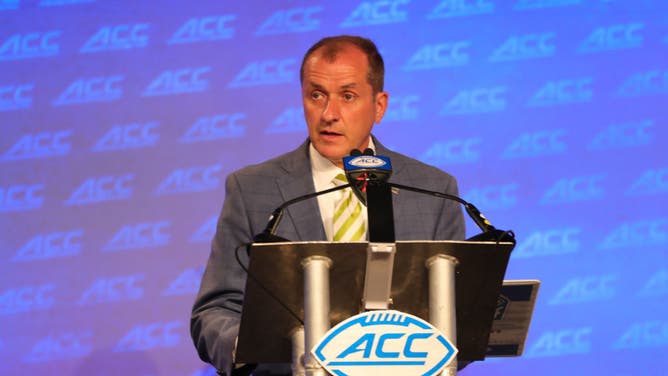Florida State AD Believes Revenue Share Conversations Are Good Step For ACC, But Is It A Ploy For Future Exit?
Talks continued Tuesday at ACC Spring Meetings on the direction in which the conference is heading in terms of a competitive revenue share. Florida State AD Michael Alford has been at the forefront of making sure his school is in the best spot moving forward in terms of financial success. But is this all a ploy for a future exit?
There has certainly been talks of whether or not the current agreement will be up to industry standards, which lasts until 2036. Knowing his school will not be able to get in the ballpark of what the SEC or Big Ten is distributing, Alford has conceded that the gap will still be wide.
"We're never going to cover the entire gap but it will allow you to be competitive," Alford noted on Tuesday.
The main talking point centers around ACC schools currently being locked into a 'grant of rights'. The payout is almost half of what the SEC and Big Ten provide their schools on a yearly basis. But in terms of how to make up the ground, the conference has been discussing different models that could provide further monetary incentives.

Atlantic Coast Conference Commissioner Jim Phillips speak to the press during the ACC Football Kickoff on Jul 20, 2022, at The Westin Charlotte in Charlotte, NC. (Photo by David Jensen/Icon Sportswire via Getty Images)
Can The ACC Offer Enough Money To Stay Competitive?
One of these models being discussed could see a school like Florida State add an additional $10 million per year for success-based achievements. This would include making a New Year's Six bowl game or the playoffs. Along with this model, the conference is discussing multiple ways to incentivize schools to not look for a way out.
"There's not a magic number right now," Alford noted. "Really what we're looking for is to make sure we're competitive, because you look at the revenue shares of other leagues and what they have, how they're going to invest it. You need to be able to make sure you stay up to par with some of the changes they're going to do and how they're going to use that revenue.
"We're the third best media agreement right now and we want to stay the third best. We've been able to compete with them, being the third best media agreement. A lot of it comes down to the choices we make on funding. As long as we're there and competitive, that's what the number is."
Do not get lost in the words of Michael Alford, he's saying a lot, but there are certain takeaways from this. Florida State, along with a number of other schools, see themselves as the bread winners in the ACC, and they want a bigger piece of the pie. It's really simple -- the current deal looks amateur compared to that of the SEC and Big Ten. The way it is currently constructed, schools like UCF will benefit more next season by joining the Big 12.
Is This All A Long-Term Strategy To Leave The ACC?
This question has been asked by numerous conference officials over the last few days. The ACC knows that they currently have Florida State, Clemson and others in a tough spot. Most of these schools would love to be in a better position financially, but the timing is not in their favor right now.
So, does this mean that there could be movement in the future? Absolutely. It almost feels as if some of these institutions are setting things up for a bigger splash in the future. Moving to a different conference is the main option. ESPN is certainly not going to renegotiate its deal right now, because they have no reason to. The company has already secured the SEC for its future, so why would they offer the ACC more money because some of the teams have hurt feelings.
In the end, it feels like a public ploy. In the next few years, when the SEC or the Big Ten are ready to expand, an opportunity to write a big check will become harder to turn down. Looking at the financials of the Big Ten and SEC contracts, it's hard for teams like Florida State and Clemson to watch it all go down.
So, the next best thing would be to get as much money as you can from the ACC right now, then start putting together an exit strategy in the coming years. It's certainly the smart play, considering that other schools in the ACC don't attract the type of viewers that the Seminoles, Tigers or Hurricanes do.
This is why we're talking about an uneven revenue share. Not having the conference crumble should be a good enough incentive to keep teams like Pittsburgh and Wake Forest happy enough with the $32 million they're receiving per year.
In terms of whether or not Florida State's Michael Alford is happy with where the conference is at right now, he's done a good job at putting pressure on the league. Alford's also saying the right things in front of the camera.
"It's a great league, with great leadership. We throughly enjoy being in this league."
I feel like we've hear these types of words before, thinking back to when Texas and Oklahoma decided to leave the Big 12. Only time will tell how this works out for the ACC, but my money is on the top teams not being around when the 'Grant of Rights' comes up for renewal in 2036.